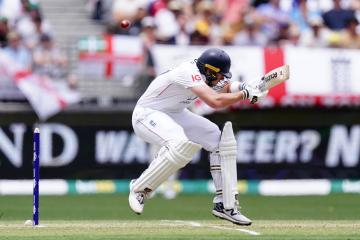Science
Rising Temperatures Put Elite Athletes at Serious Risk

Athletes around the world are facing unprecedented challenges as extreme heat becomes increasingly common during competitions and training. This issue was starkly highlighted by Danish tennis player Holger Rune, who confronted match officials during a recent tournament in Shanghai, where temperatures reached 34°C with humidity soaring to 80%. Rune’s urgent question—“Do you want a player to die on court?”—captures the growing concern among sports professionals regarding the health risks posed by rising temperatures.
As global warming intensifies, sports organizations are implementing measures such as cooling breaks, ice packs, and cold towels to help athletes cope. The phenomenon is not isolated; it is part of a broader trend affecting various sports worldwide. In Australia, where England’s cricketers are competing to reclaim the Ashes, players are bracing for conditions reminiscent of the 47.3°C recorded during a test match in 2018.
Adapting to the Heat
Elite athletes are taking proactive steps to prepare for these challenging conditions. Georgia Taylor-Brown, an Olympic champion triathlete, has adapted her training regimen to include sessions in a specialized heat chamber at Leeds Beckett University. This environment allows her to monitor vital performance indicators such as core temperature, heart rate, and perspiration levels.
Taylor-Brown emphasizes the necessity of acclimatization, stating, “For me, a big thing is to know that I’m going to get hot, but I’m not going to die.” Her approach reflects a growing awareness among athletes about the importance of preparation in the face of extreme weather.
According to a survey conducted by World Athletics, more than 70% of athletes report that extreme heat and climate change are affecting their training and competition schedules. This statistic underscores the widespread impact of climate conditions on sports professionals globally.
The Dangers of Heat Stroke
The risks associated with extreme heat are not merely theoretical. Amy Steel, a former Australian netball player, experienced life-altering effects after suffering heat stroke during her career. Steel, now 36, recalls the debilitating impact of the condition, which ended her professional playing days in 2016. She describes ongoing difficulties with memory and cognitive function, stating, “My brain will start to go into a bit of a stroke-like pattern and I’ll forget things.”
The gravity of these experiences has prompted calls for a reevaluation of the global calendar of Olympic sports. Seb Coe, President of World Athletics, has suggested that climate change may necessitate significant adjustments to how and when events are scheduled.
The International Olympic Committee (IOC) is actively addressing these challenges. Sebastien Racinais, a member of the IOC’s Medical & Scientific Commission Games Group, acknowledged the potential for extreme heat to disrupt future Olympic Games. He warned that the 2028 Summer Olympics in Los Angeles could face temperatures even higher than those experienced in Tokyo, stating, “We have to be ready for very hot ambient conditions, hotter than Tokyo was, probably the hottest so far.”
As climate change continues to escalate, athletes and sports organizations are calling for urgent action from decision-makers. Without significant interventions, there is a growing fear that the integrity of competitive sports could be compromised in a rapidly warming world. The rising temperatures not only threaten athletes’ health but also challenge the very framework of how sports are conducted globally.
-

 Entertainment3 months ago
Entertainment3 months agoAnn Ming Reflects on ITV’s ‘I Fought the Law’ Drama
-

 Entertainment4 months ago
Entertainment4 months agoKate Garraway Sells £2 Million Home Amid Financial Struggles
-

 Health3 months ago
Health3 months agoKatie Price Faces New Health Concerns After Cancer Symptoms Resurface
-

 Entertainment3 months ago
Entertainment3 months agoCoronation Street’s Carl Webster Faces Trouble with New Affairs
-

 Entertainment3 months ago
Entertainment3 months agoWhere is Tinder Swindler Simon Leviev? Latest Updates Revealed
-

 Entertainment4 months ago
Entertainment4 months agoMarkiplier Addresses AI Controversy During Livestream Response
-

 Science1 month ago
Science1 month agoBrian Cox Addresses Claims of Alien Probe in 3I/ATLAS Discovery
-

 World2 weeks ago
World2 weeks agoBailey Announces Heartbreaking Split from Rebecca After Reunion
-

 Health4 months ago
Health4 months agoCarol Vorderman Reflects on Health Scare and Family Support
-

 Entertainment4 months ago
Entertainment4 months agoKim Cattrall Posts Cryptic Message After HBO’s Sequel Cancellation
-

 Entertainment2 weeks ago
Entertainment2 weeks agoCoronation Street Fans React as Todd Faces Heartbreaking Choice
-

 Entertainment3 months ago
Entertainment3 months agoOlivia Attwood Opens Up About Fallout with Former Best Friend



















